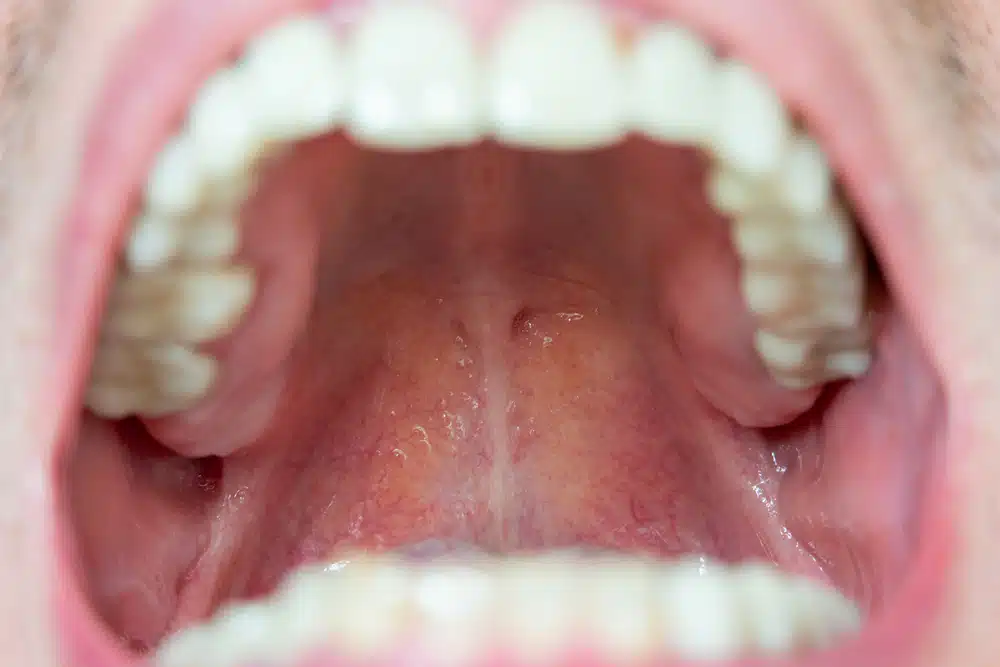
Understanding Swelling of the Roof of the Mouth
Table of Contents
Understanding Swelling of the Roof of the Mouth
Introduction:
Understanding Swelling of the Roof of the Mouth is a common yet concerning symptom that can stem from multiple health issues. While some causes are minor, like mouth burns or irritations, others may indicate underlying health conditions requiring medical attention.
This comprehensive article will explore everything you need to know about Understanding Swelling of the Roof of the Mouth, including causes, treatments, home remedies, and prevention strategies, ensuring your oral health stays on track.
The roof of the mouth, also known as the palate, is divided into two parts: the hard palate at the front and the soft palate at the back. When either section becomes swollen, it can cause discomfort, pain, difficulty eating, and other symptoms.
How to treat a swollen hard palate
How to repair a hole in the roof of the mouth
How to reduce inflammation in my mouth
What Is the Understanding Swelling of the Roof of the Mouth
Understanding Swelling of the Roof of the Mouth refers to inflammation, redness, puffiness, or the formation of lumps in this region. This condition can be acute (sudden and short-term) or chronic (long-lasting), depending on its root cause Understanding Swelling of the Roof of the Mouth.
Common Causes of Palate Understanding Swelling of the Roof of the Mouth
Here are the most common reasons behind swelling of the roof of the mouth:
1. Burns or Injuries
Hot food or drinks can burn the delicate tissue of the palate, leading to inflammation and swelling.
Example: Eating fresh pizza or drinking hot coffee.
2. Allergic Reactions
Food allergies, medications, or environmental allergens can cause swelling.
Read more: WebMD on Oral Allergy Syndrome
3. Infections
Fungal, bacterial, or viral infections such as strep throat, oral thrush, or herpes simplex can lead to swollen palates.
4. Dental Abscess or Tooth Infections
Infections that start at the root of a tooth can spread to the roof of the mouth.
5. Mouth Ulcers and Canker Sores
These painful sores often appear on the roof of the mouth, especially when the immune system is compromised.
6. Dehydration or Dry Mouth
Lack of fluids can lead to irritation, dryness, and ultimately swelling in the soft palate.
7. Tumors or Cysts
Benign or malignant growths can cause swelling, especially if persistent or increasing in size
When to See a Doctor

While some cases resolve on their own, see a healthcare provider if you experience:
- Swelling lasting longer than 3 days
- Severe pain or bleeding
- Difficulty swallowing or breathing
- Fever or pus discharge
- Growths that don’t shrink
For persistent or severe swelling, consult a dentist or ENT specialist immediate
Diagnosis and Test
When you visit a doctor for Understanding Swelling of the Roof of the Mouth, they may conduct:
- Oral examination using lights and mirrors
- X-rays or CT scans to view underlying structures
- Biopsy for suspicious growths
- Blood tests to detect infections or autoimmune disorders
External Link: Mayo Clinic – Palate Swelling Diagnosis
Treatment Options for Understanding Swelling of the Roof of the Mouth
1. Medical Treatments
Depending on the cause, treatments may include:
- Antibiotics for bacterial infections
- Antifungals for oral thrush
- Antihistamines or epinephrine for allergic reactions
- Pain relievers like ibuprofen or acetaminophen
- Corticosteroids for severe inflammation
2. Dental Interventions
Infections from teeth or gums may require:
- Root canal therapy
- Tooth extraction
- Drainage of abscess
Home Remedies for Mouth Roof Swelling
Here are natural ways to relieve swelling of the roof of the mouth:
| Remedy | Description |
| Salt Water Rinse | Gargle with warm salt water 2–3 times daily to reduce bacteria. |
| Cold Compress | Apply ice packs on the face near swollen areas. |
| Aloe Vera Gel | Apply pure aloe vera for anti-inflammatory effects. |
| Hydrogen Peroxide Rinse | Dilute and rinse to fight bacteria (never swallow). |
| Honey | Antibacterial and soothing when applied topically. |
| Baking Soda Paste | Reduces acidity and irritation in mouth ulcers. |
Prevention Tips
To avoid future episodes of swelling of the roof of the mouth, follow these tips:
- Avoid very hot foods and drinks
- Brush and floss regularly to prevent infections
- Stay hydrated
- Use a humidifier in dry climates
- Manage allergies with antihistamines or allergy testing
- Visit your dentist twice a year for checkups
Complications If Left Untreated
If untreated, Understanding Swelling of the Roof of the Mouth can lead to:
- Chronic pain or discomfort
- Spread of infection to sinuses or bloodstream
- Tooth loss from underlying dental issues
- Difficulty eating or speaking
- Serious allergic reactions like anaphylaxis
Early diagnosis and treatment are essential to prevent complications.
FAQ – Understanding Swelling of the Roof of the Mouth
1. How long does Understanding Swelling of the Roof of the Mouth last?
Minor swelling usually resolves within 1 to 3 days. If it persists longer, seek medical help.
2. Can stress cause mouth swelling?
Yes, stress can weaken the immune system, making you more prone to canker sores and ulcers.
3. Is it normal for the roof of my mouth to hurt when I eat?
It’s common if you’ve eaten something hot or acidic. However, consistent pain warrants medical evaluation.
4. What does a lump on the roof of the mouth mean?
It could be a cyst, tumor, or abscess. See a dentist or oral surgeon for proper diagnosis.
5. Are there specific foods that trigger swelling?
Yes. Spicy foods, hot beverages, and certain allergens (e.g., nuts, dairy, or shellfish) may trigger reactions.
Conclusion
Understanding Swelling of the Roof of the Mouth may seem minor at first, but it can point to various health concerns ranging from mild irritation to serious infections or allergies. Understanding the causes, recognizing symptoms early, and seeking appropriate treatment are crucial for maintaining your oral and overall health.
Whether it’s a result of a hot pizza burn, an allergic reaction, or a more serious issue, it’s important to address the swelling promptly. Use the prevention tips and remedies shared above, and don’t hesitate to consult a medical professional when needed.
Also Read
Hong Kong Work Visa
Egypt Work Visa
South Korea Work Visa
Thailand Work Visa
South Korea Work Visa
Product Sweden Work Visa
Product Switzerland Work Visa
States Work Visa
Secure Turkey Work Visa
Azerbaijan Baku Work Visa
Hong Kong Work Visa
China Study Visa
Bangladesh Study Visa
FAQs:
What Causes Swelling of the Roof of the Mouth?
Swelling of the roof of the mouth can result from infections, allergies, trauma, burns from hot food, or dental issues. It may also stem from sinus infections, cysts, or autoimmune conditions. Identifying the underlying cause is important for proper treatment, especially if swelling is persistent or painful.
Why Is There Swelling on the Roof of My Mouth?
Swelling on the roof of your mouth can be caused by infections (like sinusitis or oral thrush), trauma from hot foods, dental issues, or allergic reactions. Cysts, abscesses, or underlying health conditions such as autoimmune disorders may also contribute. If the swelling is painful, persistent, or accompanied by other symptoms, it’s best to consult a healthcare professional.
When Should You Seek Medical Attention for Mouth Swelling?
You should seek medical attention for mouth swelling if it persists for more than a few days, worsens, or is accompanied by pain, fever, difficulty swallowing, or breathing issues. Swelling caused by trauma, infection, or allergic reactions may require prompt treatment. Unexplained lumps, recurring swelling, or signs of systemic illness also warrant evaluation to rule out serious conditions like infections or oral cancers.
Where to Find Help for Roof of the Mouth Swelling?
Help for swelling on the roof of the mouth can be found by visiting a dentist, primary care doctor, or an ENT (ear, nose, and throat) specialist. Urgent care clinics can assist with sudden or severe symptoms. For persistent or unusual swelling, a referral to an oral surgeon or specialist may be necessary for accurate diagnosis and treatment.
How Can You Prevent Swelling of the Roof of the Mouth?
To prevent swelling of the roof of the mouth, maintain good oral hygiene, avoid very hot foods and drinks, and manage allergies effectively. Stay hydrated, avoid tobacco, and treat sinus or dental infections promptly. Using a mouthguard during sports and regular dental checkups can also help prevent trauma or detect issues early before swelling develops.







